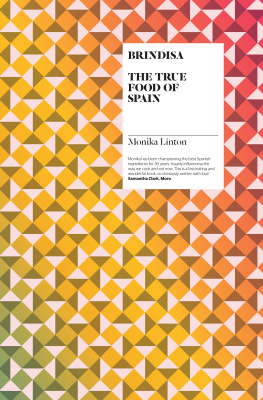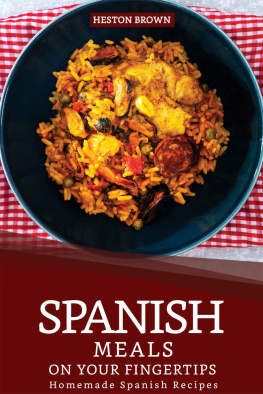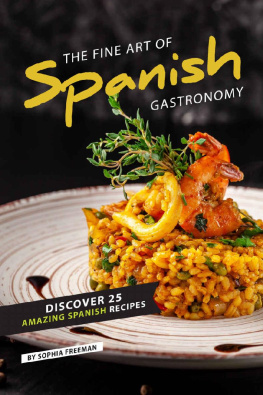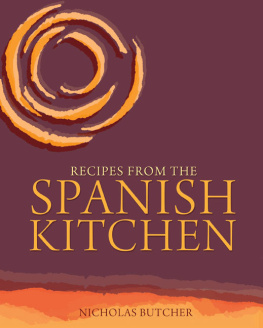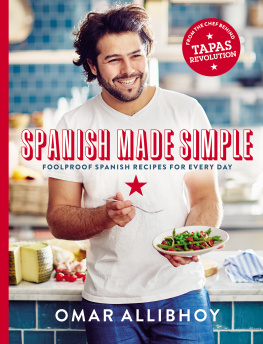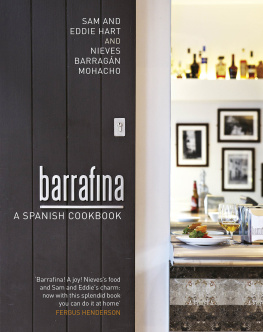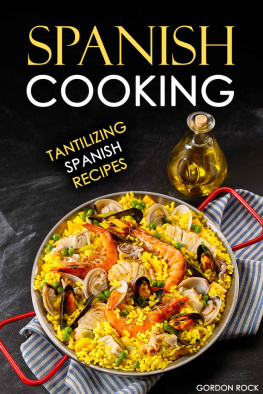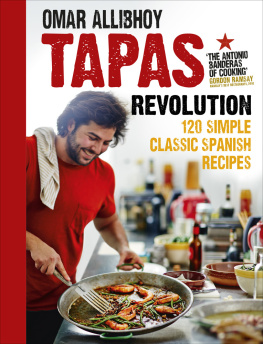Contents
DESAYUNO Y MERIENDAS
Breakfast and afternoon snacks
TAPAS Y RACIONES
Small plates
PLATOS PRINCIPALES
Big plates
POSTRE
Pudding
QUESO
Cheese
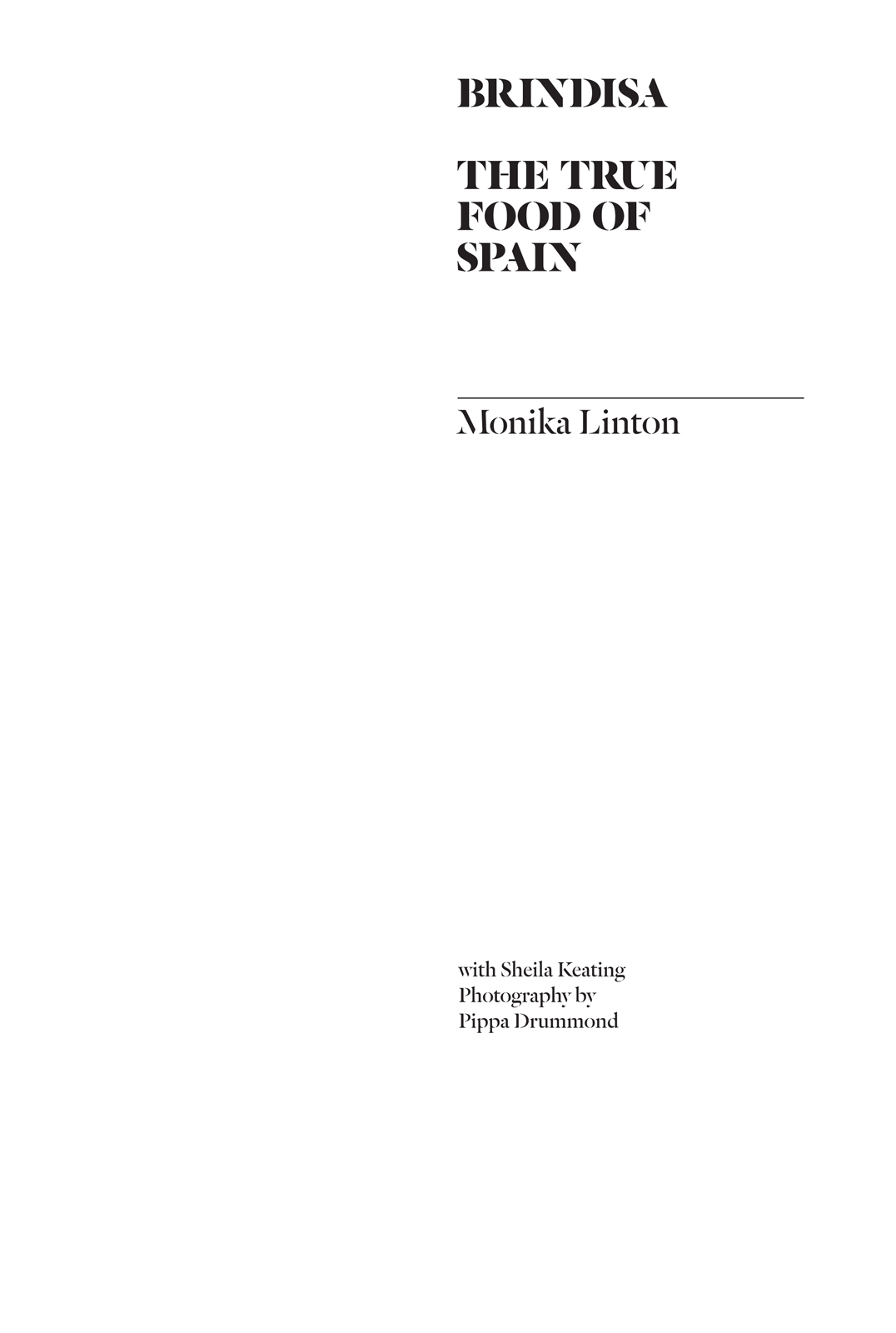
4th Estate
An imprint of HarperCollinsPublishers
1 London Bridge Street
London SE1 9GF
www.4thEstate.co.uk
First published in Great Britain by 4th Estate in 2016
Text copyright Monika Linton
All photographs Pippa Drummond
Monika Linton asserts the moral right to be identified as the author of this work.
Design and Art Direction by BLOK
www.blokdesign.co.uk
Patterns by BLOK and Jerry Sweet
A catalogue record for this book is available from the British Library.
All rights reserved under International and Pan-American Copyright Conventions. By payment of the required fees, you have been granted the non-exclusive, non-transferable right to access and read the text of this e-book on-screen. No part of this text may be reproduced, transmitted, down-loaded, decompiled, reverse engineered, or stored in or introduced into any information storage and retrieval system, in any form or by any means, whether electronic or mechanical, now known or hereinafter invented, without the express written permission of HarperCollins.
Source ISBN: 9780007307180
Ebook Edition September 2016 ISBN: 9780007307197
Version: 2016-09-22
Brindisa began, not so much with a plan, more on a shoestring and with an idea, as a salute to the real, largely undiscovered artisan food of Spain. The name, which comes from the Spanish brindis, means to make a toast, or raise your glass; and what began over 28 years ago with a few stunning cheeses never seen in the UK before just gathered momentum, as more like-minded people jumped aboard and helped to propel a kind of Spanish food revolution.
People always ask me: why food, and above all why Spanish food? And more commercially hard-nosed people have often said, How on earth did you make it work? given the hoops we had to jump through in the early days, before Spain was a part of the EU. I would travel hundreds of miles to seek out small producers and growers in remote regions and mountains, to try to convince them to be brave and let us sell their produce in Britain, where, in the late eighties, the popular notion of Spanish food and drink was still largely limited to holiday resort paella and sangra.
My answer is that, although when I was younger I would never have dreamed my future would be that of a trader, a kind of pioneering spirit, entrepreneurship and lust for travel seems to have run through the generations in our family. My grandfather on my mothers side, Eric Popper, known as Opa, was a truly inspirational figure who managed a trading post in Kota Kota in Malawi, which eventually became the countrys biggest agricultural/rice co-operative society, while my paternal grandfather, Augustine Lavery, was an old-fashioned, cautious bank manager from Leytonstone, who instilled a judicial understanding of money and business into myself, my twin siblings, Mark and Michele, and sister Moyna.
We were privileged enough to have all our grandparents with us until we were in our twenties, and the stories that echoed among the older folk conjured up pictures that still stay in my mind. Opas tales, especially, were rich and wonderful. He was a German of Jewish extraction. All his family seemed to be traders, and his wifes family were mariners of Norwegian origin. He was trading silk in Hamburg when in the early thirties life in Germany began to become uncomfortable, so they headed for Cyprus, where they bought some land. Opa dug an irrigation system and planted a citrus farm, working with the local communities. When he later found himself a job with the government of Nyasaland (now Malawi), much of what he did involved teaching local rice growers to develop new techniques. Again he introduced a proper regime of irrigation, this time to the natural swamp plains, for the cultivation of rice. He built a mill, traded the rice, and managed the Kota Kota Produce and Trading Society. As the quality of life improved for the growers, Opa set up small general stores in the district, the largest of which became like an old-fashioned department store where the local community could buy everything from sugar, flour and tinned sardines to cloth, haberdashery, needles and watches.
By all accounts he was a fantastic employer with considerable entrepreneurial spirit, and when he and my grandmother eventually returned to the UK, they brought back files which documented everything Opa had done: the measurements of the fields, all the tasks, everything recorded in unbelievable detail.
I suppose what I took most from his story was the idea of working the land from scratch, respecting the food that it gives, the skills it supports and the livestock it nurtures. His enterprise was a good model: he created jobs, opened up new markets, and used trade to feed money directly back into rural communities, to help sustain and regenerate family livelihoods. In recognition he was awarded an MBE.
Add to Opas influence my fathers great love of Spain, which rubbed off on our whole family; my mothers wonderful, healthy home cooking and her love of sharing it, often with crowds of people, which she inspired in all her children; my own childhood in Africa and Asia, which opened up my senses to a diversity of ingredients; and the seeds of Brindisa were all there.
Everything really began to crystallise when, after taking a degree in Spanish, Iberian and Latin American Studies, I moved to Spain, where I taught English for three years and immersed myself totally in Spanish life. I was completely knocked out by the air-dried hams, sausages, cheeses, olives, anchovies and other foods, but above all, it was peoples intrinsic understanding of food that was so mind-blowing. In the markets every Spanish housewife would know which of the mounds of exquisitely coloured dried beans were the best, which fish were the freshest of the catch, or which tomatoes the sweetest, whereas at that time back in England, people were buying ingredients because a celebrity cook said so, or because a magazine told them it would change their life. It wasnt part of the British culture to know and feel about food in the same way.
Spain on a Bantam 125
I had always felt the call of Spain, perhaps because my father had a yearning to be there and immerse himself in the language, the food and culture. Spain, post-war, was a country full of mystery and wildness, recovering from the experience of its own gruesome civil war, which was little understood by the rest of the world, and my father was fascinated by it all.
Dad had learned to speak Spanish when, during his military service, he had found himself convalescing from polio in a military hospital in Kuala Lumpur and, to while away the time, had asked for one of those old yellow and blue Teach Yourself Spanish books. After he returned to the UK in 1953 and went to read law at Oxford, he hankered to visit Spain, so on his first vacation the following year he borrowed a Bantam 125cc motorbike from a student friend and, with a small grant from the Oxford Society and little else, like Laurie Lee in his famous book As I Walked Out One Midsummer Morning, pointed the bike in the direction of San Sebastin.
Imagine: all the way to the Basque coast!
From there, in the space of a month, he took in Salamanca, vila, Madrid, Valencia, Barcelona and Ripoll, sleeping under the stars or in hay lofts and empty barns wherever he met generous farmers in hospitable villages, and occasionally managing to afford a basic

